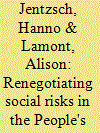|
|
|
Sort Order |
|
|
|
Items / Page
|
|
|
|
|
|
|
| Srl | Item |
| 1 |
ID:
171721


|
|
|
|
|
| Summary/Abstract |
This article analyzes agricultural reform as an element of broader shifts in the Japanese welfare regime. In postwar Japan, agricultural support and protection served as a "functional equivalent" to welfare provision in rural and semi-rural areas. However, an ongoing agricultural reform process has put pressure on aging smallholders and on JA, the powerful organization of agricultural cooperatives. This article investigates how these local actors have responded to an increasingly hostile socio-economic and political environment. To address this question, the article focuses on hamlet-based collective farming, which is a form of agricultural production that can reproduce the welfare character of the postwar support and protection regime on the local level. Based on field research in several rural and semi-rural communities, the article argues that the functions and the local proliferation of hamlet-based farming are shaped by village institutions: hamlet-level norms and rules governing land use and agricultural cooperation, as well as social ties between hamlets, local co-ops, and local governments. While the integration of village institutions into local cooperative and administrative structures can support a systematic local proliferation of collective farming, municipal and cooperative mergers have rendered such comprehensive local responses more complicated. More generally, the article proposes to investigate local acts of recombining community ties and norms with changing macro policies as a promising analytical angle to understand the ongoing renegotiation of East Asian welfare regimes.
|
|
|
|
|
|
|
|
|
|
|
|
|
|
|
|
| 2 |
ID:
157779


|
|
|
|
|
| Summary/Abstract |
Recent scholarship on Ghana’s oil industry has focused primarily on its grand contributions to the national economy while its intra-city impact has received less academic attention. Borrowing from Terry Karl’s interpretation of the paradox of plenty, and drawing on empirical evidence from 25 purposefully selected interviewees, the study examines how the oil production off the shores of Sekondi-Takoradi is creating complex processes of accumulation, contradiction, and displacement in a low-income community—New Takoradi. The results point to the accentuation of socio-economic risks in the community following the inflow of oil revenue which is shaping government’s macro-level policies. The paper opines that without attention to place-specific contexts, understanding its socio-economic risks and decadence, and its semblance of strong resilience becomes deceptive. The paper concludes that context and situation are significant for how and to what degree the oil boom matters in the oil city.
|
|
|
|
|
|
|
|
|
|
|
|
|
|
|
|
| 3 |
ID:
171714


|
|
|
|
|
| Summary/Abstract |
There have been various attempts to capture the direction of welfare provision in Japan and the People's Republic of China (PRC) as a regionally coherent welfare regime, following on from attempts by the welfare regime literature to categorize nation-states by the characteristics of their welfare provision in the West. However, stark differences between the PRC and Japan as regional neighbours, and even within the regions of each country, pose a challenge to this kind of macro-level theorizing. This special issue seeks to supplement macro perspectives on welfare regimes by exploring a range of welfare policies across both states from an ethnographic, bottom-up perspective, which captures the dynamic nature of welfare and highlights the importance of understanding how local actors request, interpret, and implement risk management strategies. The management of social risks is shown not to have one clear direction determined by, for example, market logic: instead, this special issue highlights the ways in which the burden of risk shifts between family, market, state, and communities unevenly over time, reflecting underlying institutional norms which are always up for negotiation. In doing so, this special issue emphasizes the importance of local, contextualized understandings of welfare, and suggests that the comparative welfare regimes literature should seek the micro-institutional foundations of welfare provision as the basis for comparison.
|
|
|
|
|
|
|
|
|
|
|
|
|
|
|
|
|
|
|
|
|